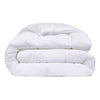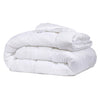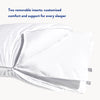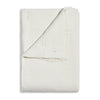The Daily Miracle
How To Calm Anxiety Attack at Night
Published
May 22, 2023
Author
Bridget Reed

Most of us will experience symptoms of anxiety at one time or another. When you’re feeling stressed or overwhelmed, it’s easy to get caught up in the endless cycle of worrying, which only makes things worse.
Anxiety can feel magnified while you’re trying to sleep because there’s nothing else to focus on. If you’re experiencing not just racing thoughts but panic attack symptoms at night, such as shortness of breath, chest pain, an increased heart rate, and even palpitations, you’ve had the symptoms of an anxiety attack.
Let’s talk about how to calm anxiety at night so that you can improve your sleep quality and feel better and more equipped to handle the next day.
What Is an Anxiety Attack?
Anxiety attacks are often referred to interchangeably with panic attacks, although they’re not exactly the same thing. While the symptoms of a panic attack can be very similar, an anxiety attack isn’t an official medical diagnosis.
The symptoms include lightheadedness or dizziness, shortness of breath, gastrointestinal issues, sweating, pins and needles, and even a fast heart rate.
A specific stressor can trigger anxiety attacks, whether that’s related to work or your personal life. They’re not uncommon in anxious people when trying to get to sleep because that’s often the time when we all walk through the events of our day and the day to come, which makes it likely that one or more ‘triggers’ will jump out at you while you’re trying to get to sleep.
But if you’re experiencing anxiety attacks regularly and can’t necessarily link them to a specific trigger, you should speak to a professional. They may actually be panic attacks, or they may be indicative of a sleep anxiety disorder.
Can You Prevent Anxiety Attacks?
There are many techniques you can practice to help minimize your risk of experiencing an anxiety attack at night, and we’ll talk about those in the next sections!
But first, let’s revisit what we mentioned above: experiencing anxiety and having an anxiety disorder are two different things. While the tactics we’ll talk about for combatting late-night anxiety may help you with your anxiety, you’ll need to seek treatment for an anxiety disorder, too.
There are a few different types of anxiety disorders, including generalized anxiety disorder, panic disorder, social anxiety disorder, and other related conditions.
If you feel like your anxiety has a serious and lasting impact on your life, and you’re struggling with panic attacks on a regular basis, you should speak to a doctor or look into meeting with a mental health professional to discuss your treatment options.
Types of psychotherapy such as cognitive behavioral therapy (CBT) and medication can be used to address the symptoms of anxiety.
Treating other underlying conditions related to your nocturnal panic attacks can help prevent future issues, too. Post-traumatic stress disorder has a strong anxiety and depression association, although they’re all separate health conditions.
If you’ve experienced some traumatic events lately, just before your sleep problems began, you should definitely add a visit to the doctor or a conversation with your psychiatrist, or even just a family member, to your to-do list.
Tips on How To Wind Down Before Bed
Sometimes, a lack of sleep and anxiety at night can create a vicious circle. If you’re struggling with sleep onset, it can turn bedtime into a stressful situation. This can make it even harder to get to sleep, which can lead to nighttime panic attacks.
So let’s talk about how to sleep with anxiety and some ways you can focus on creating good habits around bedtime to make it easier to fall asleep.
Avoid Blue Light
It’s easy to fall into a routine of looking at your phone or laptop before bed or drifting off to your favorite comforting sitcom. Unfortunately, all of these screens expose you to blue light, which can impact your inner clock and make it harder for you to fall asleep.
So leave your social media catch-ups to the daylight hours, and try low-tech options for your nighttime routine, such as reading a book or journaling.
Try Aromatherapy
Some studies have shown that aromatherapy can have a real positive effect on patients who struggle with anxiety. Implementing essential oil diffusers or scented candles in calming scents such as lavender, sandalwood, or chamomile can help signal to your body that it’s time to relax.
Take a Warm Shower
If you want to get both the benefits of a pre-snooze shower and aromatherapy, our Miracle Shower Steamers may help. The Calm variety is infused with de-stressing lavender to help you relax, which will hopefully have a positive effect on your anxiety when you’re ready to sleep.
Make Your Bed Your Haven
We spend so much time sleeping that you must be comfortable while you do. Especially if you’re struggling to get a good night’s sleep due to stress and anxiety, you want to be sure the barrier between you and sleep is as small as possible.
That means getting your bedding on lock. You can ensure your bed and sheet sizes match or upgrade your linens to higher-quality options like our Miracle Made Sheet Set. This set feels amazing and makes it so that you can do up to 3x less laundry than usual, which can definitely help you de-stress.
Once Anxiety Hits, What Can You Do?
Even if you feel like you’ve done everything possible to avoid an anxiety attack at night, sometimes it can still happen. It’s important to remember that even though panic attacks can feel extremely intense, you will be able to get through it safely.
If you’re experiencing mini panic attacks when falling asleep, you should first and foremost focus on your breathing. Concentrate on taking deep, full breaths. Practicing meditation in your day-to-day life might help you be more aware of your body and breathing so that you’re better equipped to restore a normal breathing pattern in this situation.
Another technique you can try is called grounding. Grounding helps you to remind your panicking mind and body that everything is okay. It sounds silly, but it can really help bring you back to earth.
Next time you feel an anxiety attack coming, try reminding yourself of concrete details. That could mean saying black-and-white facts about the world out loud, such as the date, or it could mean touching the objects around you to bring yourself back to the present.
Takeaway
Anxiety affects almost everyone at some point in their life. But if you’re experiencing sleep deprivation due to nighttime anxiety attacks, you know just how much it can disrupt your life.
In addition to ruling out or seeking treatment for a range of sleep disorders and mental health conditions, simply focusing on improving your sleep hygiene can put you on the path to a more relaxing, restful night’s sleep in no time.
Sources:
The Effect of Aromatherapy on Anxiety in Patients | National Library of Medicine
Anxiety Disorders | National Institute of Mental Health
Cognitive Behavioral Therapy | National Library of Medicine
The Inner Clock — Blue Light Sets the Human Rhythm | Wiley Journal of Biophotonics




























